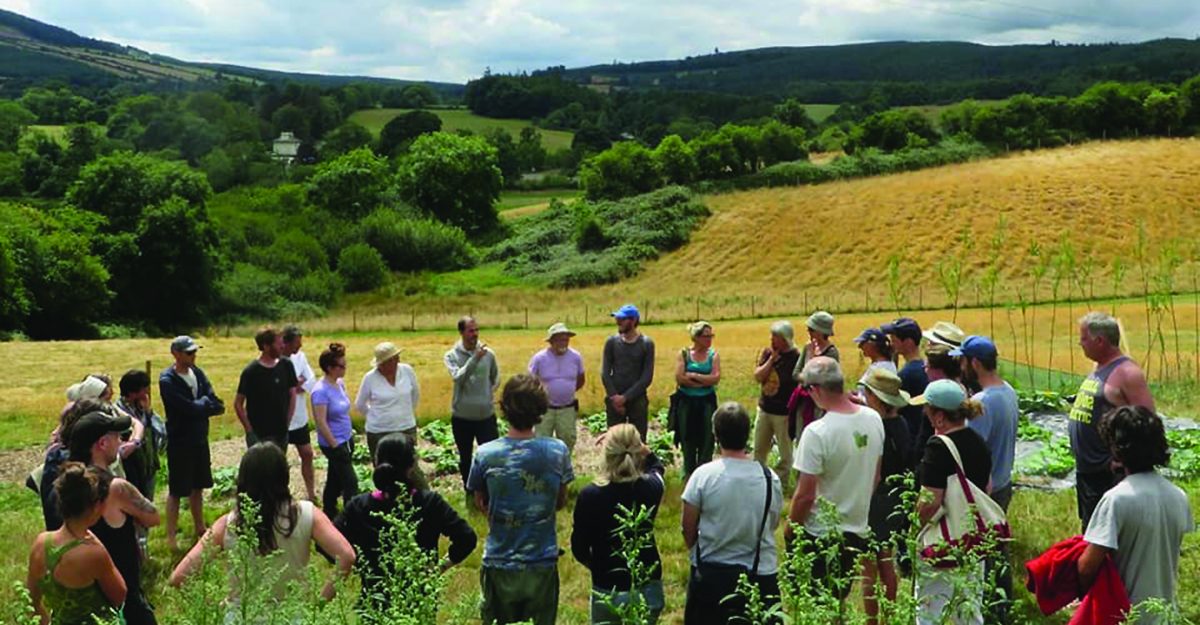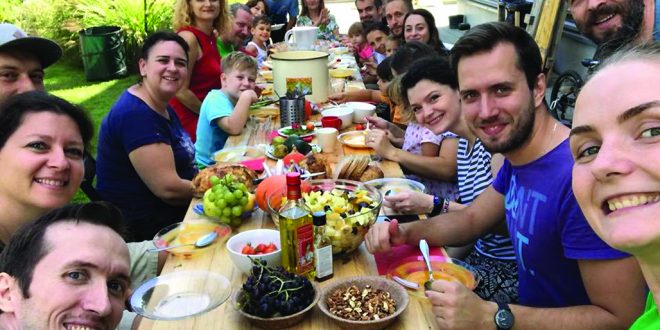On 21 September residents of Cloughjordan ecovillage, Co. Tipperary, in Ireland, and the wider local community, will gather at the annual Apple Festival, to celebrate the harvest and those that tend the orchards, work the land and create delicious food. They will arrive bearing musical instruments, bags of fruit for juicing and home-made pies — there is stiff competition for the prize of best apple pie! Activities include a guided walk of the ecovillage’s 70 native varieties of apples, a tour of the adjoining community-supported agriculture (CSA) farm, which feeds over 100 adults and children, a workshop on seed-saving and discussions about how community-led initiatives are regenerating social, economic and ecological systems. In the evening, there’ll be a shared meal (with apple pie for dessert!) and a music session.
The event is just one of hundreds taking place in Ireland and across Europe as part of the European Day of Sustainable Communities 2019 (EDSC19). The Day is a celebration of local communities taking action for a zero-carbon, regenerative and inclusive Europe. There are thousands of such communities across Europe, pioneering new approaches to sustainable living.
The diversity of these initiatives is impressive – renewable energy cooperatives, community farms and gardens, ecological housing developments, permaculture projects, car-sharing and waste reduction schemes, and many more. They are testament to the myriad ways that local people are transforming society in the face of climate and ecological breakdown, with some communities reducing their ecological impact by more than half.

Cloughjordan ecovillage is a leading example in Ireland of this community-led movement. Originally conceived 20 years ago by environmental campaigners based mainly in Dublin, it is now home to over 100 residents, a hostel, bakery, local businesses, an enterprise centre, research gardens, allotments, the CSA, a woodland, a labyrinth, shared amenity space and an amphitheatre. Homes are built to the community’s ecological charter standards, and are heated and supplied with hot water from a biomass-fuelled district heating system. The ecovillage welcomes thousands of visitors, both adults and children each year, from Ireland and abroad, who come to learn from the pioneering community.
At the national level, Cloughjordan Ecovillage’s ecological footprint is the lowest measured in Ireland at 2 global hectares (gHa), just above one-planet living. (One gHa represents the average productivity of all biologically productive areas on Earth.)
There are many other community-led initiatives in Ireland, as documented in the first Status Report on Community-led Action on Sustainability and Climate Change in Europe, a ground-breaking report published by ECOLISE, the European Network for Community-Led Initiatives on Climate Change and Sustainability, in May this year (and available as a downloadable pdf:
www.sustainable-communities.net).
Ireland has many networks working towards sustainability and low carbon futures. Several of these organise across the island of Ireland, that is Northern Ireland and the Republic of Ireland. Some networks are exclusively community-led while others are supported within state structures. Many Plastic Free and Zero Waste initiatives, for example, are not associated with any network. The People’s Energy Charter, set up in 2013, is an example of community-led public participation. Since 2015, local authorities across the Republic of Ireland have set up the Public Participation Network with the remit to engage citizens in local decision-making, while Ireland‘s pioneering Citizens’ Assembly, made up of a chairperson and 99 citizens, randomly selected to be broadly representative of the Irish electorate, has delivered clear recommendations for climate action.
The Transition Network website lists ten initiatives in Ireland, including one in Kinsale, Co. Cork, the town where Rob Hopkins taught permaculture before returning to England where he initiated the Transition Town movement. A survey from 2017 showed that many Irish Transition initiatives were collaborating locally with groups such as the civic Tidy Towns initiative and local schools, and nationally with bodies such as the Sustainable Energy Authority Ireland (SEAI). Many were being supported by funding sources such as LEADER.
Permaculture is alive and well in Ireland, with an informal network across the island. Permaculture Design Courses are offered by Cultivate Living and Learning, a practical sustainability organisation based in Cloughjordan Ecovillage, and Carraig Dúlra, in Co. Wicklow on the east coast.
Other community-led initiatives include The Hollies and Enriched Earth. The Hollies is a centre for training in practical sustainability on about ten hectares near Enniskeane in West Cork, owned by educational charity An Baile Dúlra Teoranta. It aims to create working examples of what a sustainable society might look like regarding housing, energy, gardening, economics and community development. Enriched Earth is pioneering an educational ecovillage in north Roscommon as a prototype model of regenerative living and collaborating with Global Ecovillage Network (GEN) to develop of a series of ecovillages across Ireland, including Cloughjordan Ecovillage, also a GEN member.
Another noteworthy Irish network is that of the Irish Sustainable Energy Communities (SEC), made up of over 200 communities involved or interested in community energy, and supported by SEAI. Some have been influencing local energy use for years, while others are thinking about it for the first time. The aim of the network is to encourage and support a national movement throughout the country. A SEC can include a range of different energy users in the community, such as homeowners, sports clubs, community centres, local businesses and churches. In this way, a SEC connects sustainable energy, local economic development and public wellbeing.
Many of these Irish initiatives will join with Cloughjordan Ecovillage in celebrating the European Day of Sustainable Communities on 21 September. ECOLISE, the main organiser of the day, will bring messages from communities to policy makers at European level, helping to push for a wider mainstreaming of community-led approaches to the great challenges of our time. All the while celebrating the wonder and diversity of community-led action, including the baking of apple pies.
All communities and citizens who are committed to transformation for an inclusive, regenerative and zero-carbon Europe are invited to co-create the European Day of Sustainable Communities. How? By organising an event, no matter how small, and registering it on www.sustainable-communities.net available in 8 languages.
 Eco123 Revista da Economia e Ecologia
Eco123 Revista da Economia e Ecologia


